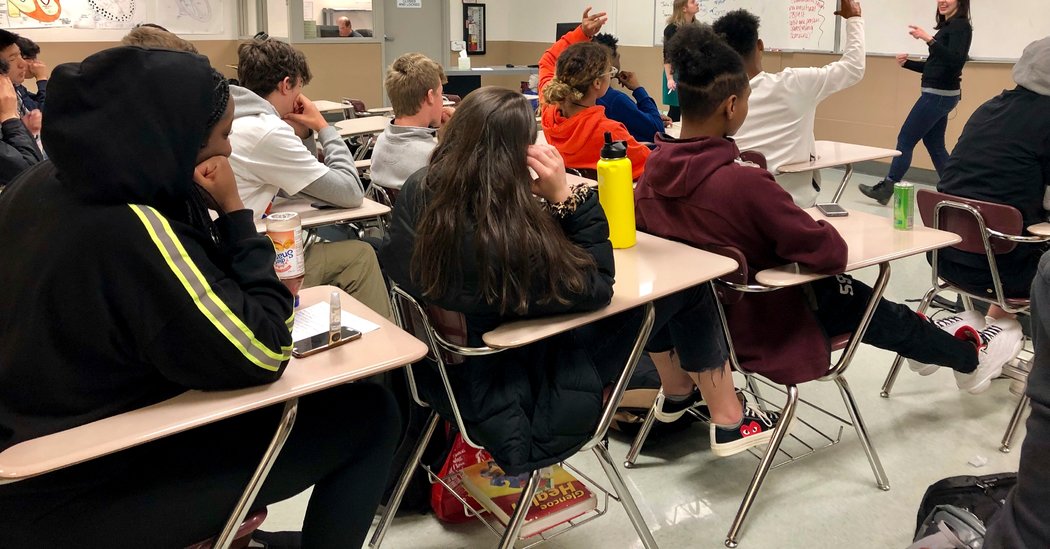
Depression and anxiety. The state of the country. Climate change. Mass shootings. Today’s students are grappling with a variety of issues beyond the classroom.
To that end, lawmakers in two states have recently recognized the importance of the mental health of their students by allowing them to take sick days just for that. The measures “empower” children to take care of their mental health, one expert said.
On July 1, a law in Oregon went into effect giving students five mental health days in a three-month period. In 2018, Utah changed the definition of a student’s “valid excuse” to miss a day to include an illness “which may be mental or physical.” According to a recent study, teenagers named depression as a problem among their peers. Others blamed their anxiety on politics or climate change.
In Oregon, the bill was supported by several teenagers. One recent graduate, Hailey Hardcastle, told The Associated Press that the bill was inspired by politically active students in Parkland, Fla., and that she and her peers wanted to address mental health issues in schools.
Another former student, Derek Evans, voiced his approval. “Dealing with anxiety throughout high school has always left me tired, exhausted up against some weeks, and the difference one day makes is honestly life-changing,” he told Fox 12 Oregon.
Ms. Hardcastle said some parents had opposed the bill, raising concerns that students could take mental health days by pretending to be sick. But other parents cited a real need for the days.
The parents of Chloe Wilson, who died by suicide in 2018, told The Associated Press that their daughter, who had faced bullying after coming out as bisexual, had pretended to be sick in order to stay home from school.
“Because she lied to get her absences excused, we didn’t get to have those mental health conversations that could have saved her life,” her mother, Roxanne Wilson, said.
The new laws are “a huge win, especially for individuals and families that are affected by mental health conditions,” said Jennifer Rothman, senior manager for youth and young adult initiatives for National Alliance on Mental Illness.
Suicide rates for children have been rising as well, Ms. Rothman said. “The suicide rates for kids are not going down,” she said. “They are actually rising very quickly, which I think is making schools think a little bit more about mental health conditions.”
According to a 2017 report by the Centers for Disease Control and Prevention, suicide is the second leading cause of death for 10- to 34-year-olds.
A 2017 Youth Risk Behavior Surveillance report from the centers showed that during the 12 months before the survey, 19 percent of high school students had been bullied on school property and another 7.4 percent had attempted suicide.
From 1999 to 2016, suicide rates increased 28.2 percent in Oregon, and rose 46.5 percent in Utah, according to the centers.
Ms. Rothman said the days off not only give students a chance to speak up about their needs, but help break the stigma associated with mental health.
She said children who are “quietly suffering” from symptoms of mental illness would most benefit from taking the days.
“We have a lot of kids that are dealing with this in silence because they’re embarrassed or they think people are going to judge them and not believe them,” Ms. Rothman said.
She said federal mental health education should be available to students, school staff and family members. The lack of such education hinders the ability to recognize and understand the warning signs, Ms. Rothman said. Adults may think that children are overreacting or that their complaining about mental health problems is a phase.
“I don’t know that it coddles children when they have strep throat that keeps them at home and they have a fever,” Debbie Plotnick, vice president of mental health and systems advocacy at Mental Health America, said Monday. “It is not coddling adults when they need a mental health day.”
Ms. Plotnick said the laws allow children with mental illness to focus on their health instead of attending school only to suffer from “presenteeism,” which she described as being physically present but “not fully present” and responsive to what is happening around them.
She said that there were few risks to giving children the agency to take mental health days and that the legislation was a step in the right direction for the country.
“We think that this will be a model for other states to follow,” Ms. Plotnick said.
“As a matter of public policy, for decades we have waited until stage four, until crisis, and then treating it only through incarceration or having kids thrown out of school,” Ms. Plotnick said. “We think that this kind of legislation will help people reach out when they need to, not be afraid to do so and not be ashamed.”
While the legislation in Utah and Oregon has made headlines, it’s not the first time a state has acted in favor of a child’s mental health. Minnesota passed a bill in 2009 that said conditions that “require ongoing treatment for a mental health diagnosis” are sufficient for excused absences, and that a written note from a physician or mental health professional may be required to approve the absence.
“I hope this gets out there and schools start to think about it,” Ms. Rothman said of the trend. “I hope it continues to spread.”

